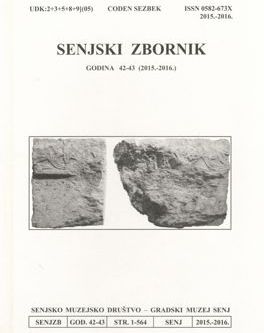Zakon od 31. listopada 1888. Ob uređenju pučke nastave i obrazovanja pučkih učitelja u Kraljavinah Hrvatskoj i Slavoniji
The law of 31st October 1888 About the organisation of primary schools and teacher training in the Kraljavinah / Kraljevinah Kingdoms / border zones of Croatia and Slavonia
Author(s): Mirko RagužSubject(s): Education, Regional Geography, School education, History of Education, Sociology of Education
Published by: Senjsko muzejsko društvo i Gradski muzej Senj
Keywords: school law; pupils; teachers; schools; confessional schools;
Summary/Abstract: After more than a decade had past since the adoption of the first autonomous Croatian school law, at that time one of the most liberal in Europe (1874), some weaknesses and shortcomings in the education of pupils and teachers appeared, from the one aide, and yet in the same period significant progress was made in many of the areas of Croatian schooling. And this was the starting point from which new changes were sought in Croatian schooling at the end of the 19th century. Finally the Military Frontier of civilian Croatia was disestablished, so the needs for a new political reorganisation of the administration and judiciary matured, plus the adoption of a single school law for the whole of Croatia.Political relations in Croatia in the second half of the 19th century changed most significantly in relation to Austria and Hungary whereby Croatia made numerous concessions to its own detriment, and therefore to the detriment of the overall upbringing and education of the children. Under certain pressure it made great concessions to Serbians in Croatia who sought certain privileges in schooling. They achieved it with another Croatian school law from 1888. And whilst this law presumes some qualitative changes, it became a significant factor in future disagreements on a national level. It balanced the Croatian language of the majority of the people with one of the numerous national minorities in Croatia, with Serbian, whilst in Serbian religious schools it was favoured in many requirements. The Hungarian aristocrat Khuen Hedervary upon becoming the Croatian ban misled with an absolutist regime and attempted to put the Croatian national animal to the side. In this he did not bypass the Croatian school system that was on the rise. The numerous guidelines of this law were, of course with diverse variations, in force for many years and significant legal footings. And this is the subject of this work.
Journal: Senjski zbornik - prilozi za geografiju, etnologiju, gospodarstvo, povijest i kulturu
- Issue Year: 43/2015
- Issue No: 1
- Page Range: 465-488
- Page Count: 24
- Language: Croatian

